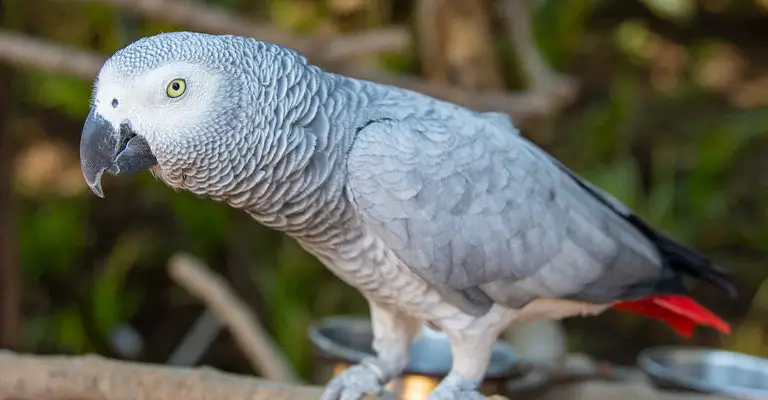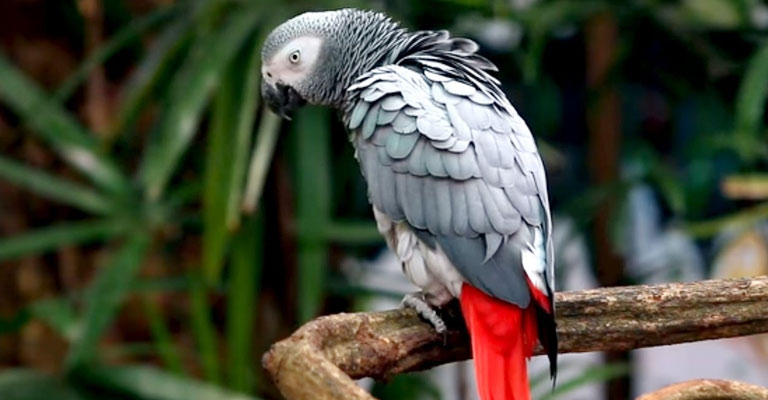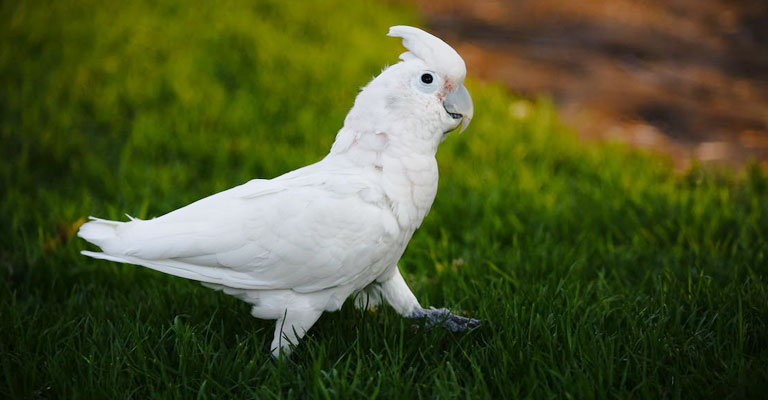The joy of sharing your life with a pet bird is immeasurable, but it’s important to consider the commitment that comes with it. Choosing a pet bird that lives a long time is a decision that can span decades, requiring dedication, love, and attention.
In this blog post, we’ll explore some remarkable avian companions known for their extended lifespans and delve into the factors that contribute to their longevity.
From the intelligent African Grey Parrots to the colorful and sociable Macaws, there’s a wide variety of long-lived bird species to choose from. But it’s not just about selecting the right bird; it’s also about providing the right care.
We’ll discuss the essential aspects of nutrition, enrichment, healthcare, and social interaction that can help your feathered friend thrive for years to come.

How Long Do Pet Birds Live?
The lifespan of pet birds varies widely depending on their species, diet, environment, and overall care. Generally, smaller species like budgerigars or canaries can live around 5 to 10 years, while medium-sized birds like cockatiels or lovebirds may reach 15 to 20 years with proper care.
Larger parrots, such as macaws and African greys, have even longer lifespans, often exceeding 30 to 50 years or more. Proper nutrition, a spacious and stimulating environment, regular veterinary check-ups, and social interaction all contribute to a bird’s longevity.
Avoiding toxins like tobacco smoke and providing mental and physical stimulation can also impact their lifespan. It’s crucial for potential bird owners to research the specific needs of their chosen species to ensure they can commit to providing a fulfilling and lengthy life for their feathered companions.
Pet Birds That Live a Long Time
Several pet bird species are known for their remarkable longevity, often living for decades when provided with proper care. Here are some of the avian companions that can enjoy extended lifespans:
African Grey Parrots (Psittacus erithacus)

African Greys are renowned for their intelligence and can live well into their 50s or even 60s. They require mental stimulation, a balanced diet, and social interaction to thrive. Their ability to mimic speech makes them fascinating companions.
Macaws
Large and vibrant, macaws can live up to 50 years or more. They are highly social birds, so regular interaction with their human families is crucial. Their striking plumage and playful personalities make them popular choices.
Cockatoos
With proper care, many cockatoo species, such as the Sulphur-crested and Moluccan cockatoos, can reach 40 to 60 years of age. They are known for their affectionate nature but also require substantial attention and mental stimulation.
Amazon Parrots
Amazon parrots have a lifespan of 25 to 50 years or more. They are known for their vibrant colors and engaging personalities. A balanced diet and regular mental stimulation are essential for their well-being.
Budgerigars (Budgies)
Among the smaller parrot species, budgies can live up to 15 years with proper care. Despite their size, they are social and can form strong bonds with their owners.
Cockatiels
These medium-sized parrots can live 15 to 25 years or more. They are known for their charming personalities and are relatively low-maintenance compared to larger parrot species.
To ensure the longevity of these pet birds, owners should provide a spacious and enriched environment, a balanced diet, regular vet check-ups, and plenty of social interaction. Additionally, understanding the specific needs and behaviors of each species is essential for fostering a long and fulfilling companionship.
Factors to Consider While Choosing the Right Pet Bird That Live Longer

Selecting the right pet bird that lives a long and healthy life is a significant decision, as it entails a commitment that may span decades. Several critical factors should be considered when choosing a pet bird with longevity in mind:
Lifespan
Different bird species have varying lifespans. Research the potential lifespan of the species you’re interested in to ensure you’re prepared for a long-term commitment. Some species, like macaws and African grey parrots, can live for several decades, while others, like canaries, have a shorter lifespan.
Size and Space
Consider the size of the bird and the space you can provide. Larger birds like macaws and cockatoos require more significant living spaces, while smaller species like budgerigars or cockatiels can adapt well to smaller cages or aviaries.
Personality and Temperament
Each bird species has its own unique personality traits. Some are more social and affectionate, while others may be more independent or prone to aggression. Choose a species that matches your personality and lifestyle to ensure a harmonious relationship.
Dietary Requirements
Bird nutrition is crucial for their health and longevity. Research the dietary needs of your chosen species and be prepared to provide a balanced and varied diet. Fresh fruits, vegetables, and high-quality pellets should be staples.
Mental Stimulation
Many long-lived bird species are highly intelligent and require mental stimulation to thrive. Toys, puzzles, and social interaction are essential to prevent boredom and behavioral issues.
Social Needs
Some birds, like African grey parrots and cockatoos, are highly social and thrive on interaction with their human companions. Others may be more independent. Ensure you can meet the social needs of your chosen species.
Healthcare
Regular veterinary check-ups are vital for maintaining your bird’s health. Be prepared for potential medical expenses and consider pet insurance to help cover these costs.
Noise Level
Consider the noise level of the species you’re interested in. Some birds, like macaws, can be quite loud, which may not be suitable for apartment living or noise-sensitive households.
Allergies
Bird dander and feathers can trigger allergies in some individuals. Ensure that no one in your household has allergies to birds before bringing one into your home.
Legal Considerations
Research any legal restrictions or requirements regarding pet bird ownership in your area. Some species may be subject to permits or regulations.
Rescue or Adoption
Consider adopting a bird from a rescue or shelter. Many birds in need of homes are already mature, and adopting one can be a rewarding experience.
Choosing a pet bird that lives longer requires careful research and consideration of these factors. It’s essential to be fully prepared for the responsibilities and commitment involved in providing a loving and enriching environment for your avian companion, ensuring a happy and healthy life together.
How to Take Care of Pet Birds to Help Them Live Longer?

Taking care of pet birds to help them live longer involves a combination of proper nutrition, a stimulating environment, regular veterinary care, and attentive social interaction.
Here’s an elaborate guide on how to provide the best care for your feathered companion:
Nutrition
Balanced Diet: Offer a balanced diet that includes high-quality commercial pellets specific to your bird’s species, fresh fruits, vegetables, and small amounts of healthy seeds.
Variety: Rotate food items to provide a diverse range of nutrients. Avoid feeding only one type of food, which can lead to nutritional deficiencies.
Fresh Water: Ensure a constant supply of clean, fresh water. Change the water daily to prevent contamination.
Housing
Cage Size: Choose an appropriately sized cage that allows your bird to spread its wings and move around comfortably. Larger birds require more substantial enclosures.
Bar Spacing: Ensure the bar spacing on the cage is suitable for your bird’s size and species to prevent injury or escape.
Cage Placement: Place the cage in a well-ventilated area away from drafts, direct sunlight, and extreme temperatures.
Environmental Enrichment
Toys: Provide a variety of toys that encourage mental stimulation and physical exercise. Toys like puzzles, ropes, and chewable items are great choices.
Rotate Toys: Change toys regularly to prevent boredom and encourage exploration.
Foraging: Incorporate foraging activities into their daily routine to mimic their natural behavior. Hide treats or food within toys or foraging devices.
Social Interaction
Time and Attention: Spend quality time with your bird daily. Birds are social animals and thrive on interaction with their human flock.
Training: Engage in positive reinforcement training to build trust and mental stimulation. Teach them tricks or commands to keep their minds active.
Companionship: Some species, like parrots, may benefit from the company of another bird, but be cautious as this can lead to aggression or neglect if not managed properly.
Healthcare
Regular Check-ups: Schedule routine veterinary check-ups, at least annually, or as recommended by your avian veterinarian.
Quarantine: Quarantine new birds for at least 30 days to prevent the spread of diseases to existing pets.
Vaccinations: Follow your veterinarian’s recommendations regarding vaccinations and preventive care.
Hygiene: Keep the cage and surrounding area clean to minimize the risk of infections. Remove uneaten food, droppings, and clean water and food dishes daily.
Behavioral Health
Recognize Stress: Learn to recognize signs of stress in your bird, such as feather plucking or aggressive behavior, and address the underlying causes promptly.
Consistent Routine: Establish a consistent daily routine to provide a sense of security for your bird.
Others
Dietary Supplements: Consult with your avian veterinarian regarding any necessary dietary supplements to address specific health concerns, such as calcium supplements for birds prone to calcium deficiency.
Limit Toxins: Keep your bird away from tobacco smoke, aerosol sprays, and household chemicals, as these can be toxic.
Travel and Boarding: If you need to travel, arrange for a responsible caregiver or boarding facility familiar with bird care.
Education: Continuously educate yourself about your specific bird’s species, needs, and behaviors to provide the best care possible.
By following these guidelines and providing a loving and enriching environment, you can help your pet bird lead a long, healthy, and fulfilling life as a cherished member of your family. Remember that each bird is unique, so pay attention to their individual preferences and needs to ensure their well-being.
FAQs
Pet birds’ lifespans vary by species, but many can live for decades. Smaller birds like budgerigars may live 5-10 years, while larger parrots like macaws and African greys can exceed 50 years with proper care.
Factors include a balanced diet, mental stimulation, social interaction, regular veterinary care, a safe environment, and avoiding toxins like smoke.
Yes, providing a stimulating and healthy environment, offering a varied diet, and ensuring regular vet check-ups can significantly enhance a bird’s chances of a longer life.
African grey parrots, macaws, cockatoos, and Amazon parrots are among the species known for their potential to live well into their 50s or beyond.
Before adopting a long-lived pet bird, consider your ability to provide lifelong care, including financial responsibility, time commitment, and understanding the specific needs and behaviors of the chosen species.
Wrapping Up
Choosing a pet bird that lives a long time is a decision that should not be taken lightly, but with the right knowledge and commitment, it can lead to a deeply rewarding companionship.
Remember that each bird is unique, and understanding their specific needs is crucial. Whether you opt for the charm of a Cockatiel or the majesty of a Macaw, the love and care you provide will significantly influence their longevity.
By creating a nurturing environment, offering mental stimulation, providing proper nutrition, and seeking regular veterinary care, you can ensure that your feathered friend enjoys a happy and healthy life that spans decades, enriching your life in the process.
Have a nice day.